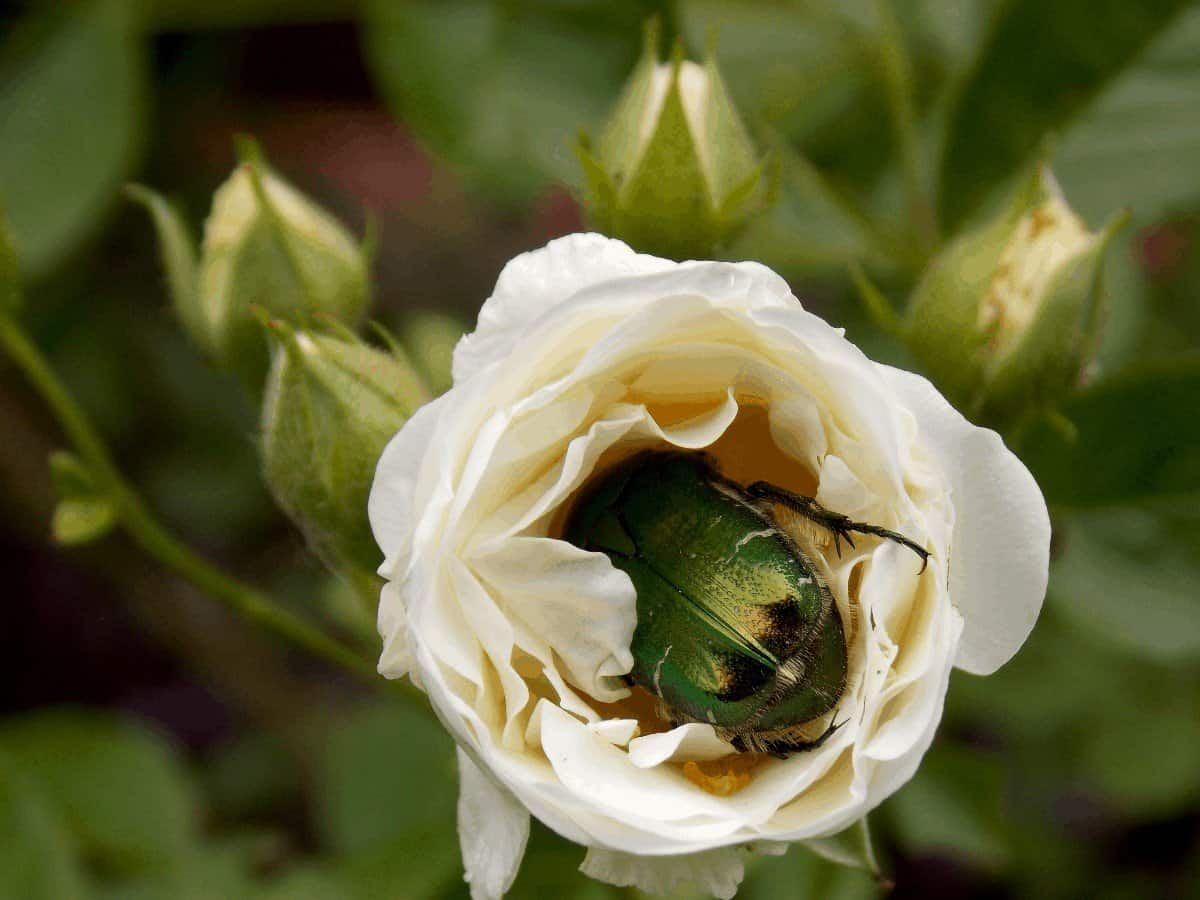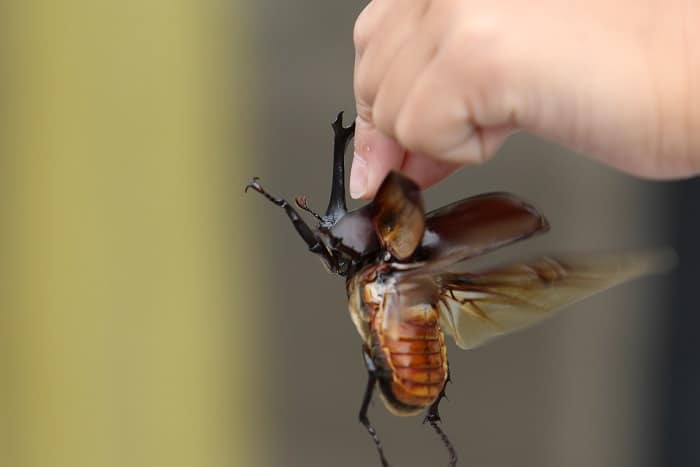Last Updated on December 30, 2021 by
Roses have long captivated people with their distinct colors, beauty, and difficulty to grow. The upper class of the Victorian era even created an entire language of flowers with roses at the center to express their emotions when they otherwise could not. It is no surprise, then, that many modern individuals now choose to have rose bushes and blooms grow in their gardens to add extra elegance and beauty to the landscape.
Unfortunately, roses can be quite frail and susceptible to their environment. Amateur gardeners often have trouble keeping the bushes healthy because of poor soil, bad trimming, or the ever-present pests that are attracted to the blooms. If you have a rose bush, the most common pest you’ll have to deal with is the Japanese beetle, a veritable scourge that rains down upon gardens like a plague of locusts.
If you’re tired of Japanese beetles, check out this quick guide to get rid of them on roses.
How to Get Rid of Japanese Beetles
It’s important to know your enemy. When it comes to roses, the Japanese beetle hasn’t been a threat for long. While they are native to Japan, most ecologists believe the beetles arrived in the United States around 1912 in a shipment of iris bulbs. They then spread quickly, reproducing and resulting in the modern ecological issue seen today.
What Is a Japanese Beetle?
As the name suggests, the Japanese beetle is a beetle characterized by an iridescent brown and green shell. They are known to prey on over 300 different plants, but roses are their favorite food. They are believed to do over $540,000,000 worth of damage each year just to established industries, with little known about the destruction wrought on the natural development of plants.
Each beetle is between 8 and 11 mm. long with small white patches of hair at the edge of their backs. The main reason why they are an issue is because the beetles can reproduce rapidly and leave grubs behind for the next generation of flowers. They also have no natural predators in the United States, while those in Japan do. This means the population can grow out of control rapidly since nothing is eating the beetles or their grubs.
Effective Methods for Roses
There are natural and synthetic (chemical) methods to eliminate the beetles that roost and feast on roses. One of the most effective options for amateur and professional gardeners alike is the use of a pesticide that attacks Japanese beetles while they are grubs. Some products, like the eponymous Milky Spore, can be applied to the soil around rose bushes. When the grubs hatch, they eat the pesticide and slowly die. Other beetles then become affected by the spores left behind by the corpses. The result is the destruction of the population before they eat your roses, and with no detrimental effect on the flowers.
In addition to the pesticide for grubs, you can also use a basic insecticide for the adults. It is unrealistic to expect every grub to be affected, especially since the beetles could be traveling to reach your roses. Most insecticides to target Japanese beetles can be sprayed on or around the rose bush without damaging it. These work in a variety of ways, but many will poison or desiccate the beetle so it dies almost immediately after exposure.
If you do not like chemical treatments, there are still some options. One of the most basic is almost ridiculously simple: Pick the beetles off your flowers. The Japanese beetle is notoriously slow, and they can be removed by hand in the morning and tossed in a bucket of soapy water so they drown. I used to do this all the time as a kid to help my mom in the garden.
You can also try to plant some repulsive – to the beetles – herbs in the garden. Catnip, chives, and garlic are quite effective, but they won’t work as well as more chemical methods. You also might need to keep the neighborhood cats out of the garden.
What Not to Do
The internet is unfortunately filled with misinformation, especially when it comes to pest control. While you might be desperate to save your roses from the scourge of the Japanese beetle, there are still some steps to avoid. One of the most important things to do is to avoid the use of common household products in your rose garden. Roses are delicate flowers, and using dryer sheets or laundry detergent around them is likely to cause decay and death from chemical exposure.
Besides keeping the laundry in the laundry room, you should also avoid the patented “Japanese beetle traps” currently on the market. A study conducted by the University of Kentucky indicated the traps actually attract more beetles than they kill. The result is roses plagued by pests and beetle corpses littering the soil. Other plants nearby can even become affected, laying host to tons of beetles.
Finally, don’t wait to take action. The best treatments for Japanese beetles need to be implemented early in the insect’s life cycle, so you need to address the problem before it gets out of hand. Remember, it is better to be cautious than foolhardy.
Conclusion
Japanese beetles can be a vicious threat to your rose garden, especially if you have never encountered them before and begin the season unprepared. After all, the most effective method to deal with these pests is to plan ahead and spread an insecticide around your rose bushes before the beetle season begins. If you get the right one, you can even stop their spread, growth, and development with a single application.
Beyond using pesticides, you can utilize more natural methods like your hands, soapy water, and even plants like catnip. If you choose these methods, though, they tend to be less effective than pesticides. However, they can lead to healthier roses in the long run, so be sure to do your research before picking a method.
FAQs
How do you get rid of Japanese beetles on roses naturally?
The best way would be to use either insecticidal soap or pyrethrum spray on the plant itself before you notice there’s beetle infestation.
Can Japanese beetles kill a rose bush?
Japanese beetles are one of the most common insect pests in the United States. They can quickly and easily kill a rose bush by eating away at it from the inside out. However, there is still some hope for your roses because Japanese beetles have to eat several times their body weight before they die.
Japanese beetles have been known to kill roses as well as other plants that have similar traits such as zinnias, lavenders and geraniums. The only way to prevent this is by covering your plants with a barrier such as fine mesh or cardboard so the beetles cannot get through.
What to plant with roses to deter Japanese beetles?
Roses can be planted with certain things in order to deter Japanese beetles from feeding on them.
What you plant with roses to deter Japanese beetles:
• Citrus peel
• Spices
• Garlic
• Myrtle-leafed geranium
Will roses recover from Japanese beetles?
Japanese beetles have already been attacking roses in North America and Europe. In some areas, they have devastated a third of the rose plantings.
The wildflowers are their main target so this insect is a threat to many types of flowers across the globe.
But for some species of rose plants, there is hope for recovery. For example, we can transplant the plants to a different location that has less Japanese beetle population or maybe just let them die off on their own and wait for new flowers to spring up after three years.
Why are Japanese beetles attracted to roses?
Japanese beetles are attracted to roses because they have a scent. They are drawn in by the fragrance and this helps them find their host plants, which can be roses. Japanese beetles also have a sense of smell, which is why they may visit flowers that don't have a strong scent like basil or blackberry leaves.
What is the natural enemy of the Japanese beetle?
Japanese beetles are a type of beetle native to East Asia and North America. They can be found in large numbers in woodlands or forests where they feed on leaves from deciduous trees such as maple, willow, and oak trees. These beetles eat a lot of leaves and can cause major damage for these trees if left uncontrolled.
The natural enemy of the Japanese beetle is a parasitic wasp that lays its eggs on the caterpillars, resulting in their death. As long as there are enough wasps, they will keep the population at bay and prevent it from spreading further.
Why are there so many Japanese beetles in my yard?
Japanese beetles are incredibly hardy and breed in large numbers. Thanks to their ability to resist pesticides and resistance to natural insecticides, they can quickly infest an area.
Japanese beetles are also a group of agricultural pests that have been known to infest crops and fruit trees, causing millions of dollars in damages each year. They also like to feed on flowers and vegetables, so if you want your garden or yard free of these bugs, it's best to target them first before the plants themselves!
Japanese beetle adults are usually only active during the summer months and they reproduce much more quickly than other insects. This means that it is difficult to control them using traditional methods like pesticides or traps because they become resistant.
Tony Manhart is a passionate gardener who has been tending to gardens for over 20 years. He takes pride in creating beautiful outdoor spaces with plants, trees, and shrubs that can thrive in any environment. He loves to share his knowledge with others and has taught classes on gardening basics and advanced techniques. He is committed to sustainability, using natural and organic methods to create and maintain gardens. He also works with local organizations to create green spaces for communities. When he’s not gardening, Tony enjoys hiking, reading, and spending time with his family.



